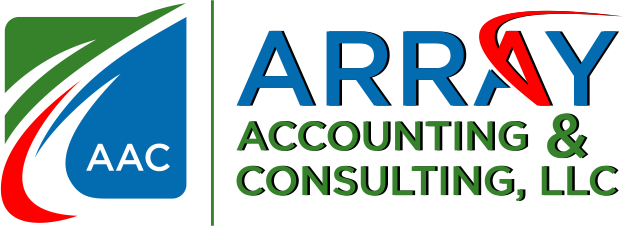6 Ways Nonprofit Controllers Improve Financial Transparency & Compliance
- Array Accounting & Consulting

- Jan 31
- 3 min read

Financial transparency and compliance are critical for nonprofit organizations to maintain donor trust, meet regulatory requirements, and secure funding. As a nonprofit controller, your role is pivotal in ensuring accurate reporting, proper fund allocation, and adherence to financial laws. In this guide, we’ll explore best practices for improving transparency and compliance in nonprofit financial management.
Why Financial Transparency Matters in Nonprofits
Nonprofit organizations rely on public trust, grants, and donations to fulfill their missions. However, financial mismanagement or a lack of transparency can lead to severe consequences, including loss of funding and reputational damage. According to a 2023 survey, 68% of donors consider financial transparency a top factor when deciding which nonprofits to support (Charity Navigator, 2023). Additionally, nonprofits that provide clear financial disclosures see a 30% increase in donor retention rates (Giving USA, 2024).
Best Practices for Improving Financial Transparency
1. Maintain Accurate and Consistent Financial Records
Clear and accurate record-keeping is the foundation of financial transparency. Nonprofit controllers should:
Implement cloud-based accounting software for real-time tracking.
Reconcile accounts monthly to prevent discrepancies.
Use standardized reporting templates to ensure consistency.
Pro Tip: Automating expense tracking can reduce errors by up to 40% (Forbes, 2024).
2. Regularly Publish Financial Reports
Nonprofits should make financial reports available to stakeholders, donors, and the public. Essential reports include:
Monthly financial reports with key financial statements, Key Performance Indicators (KPIs) and operational targets.
Annual financial statements (balance sheet, income statement, and cash flow statement).
IRS Form 990, which provides insight into revenue, expenses, and executive compensation.
Quarterly updates to show how funds are allocated.
Best Practice: Ensure reports are easy to access on your nonprofit’s website. Organizations with transparent financial disclosures are 50% more likely to receive large donations (National Council of Nonprofits, 2024).
3. Strengthen Internal Controls and Compliance Policies
A strong internal control system helps prevent fraud and financial mismanagement. Key steps include:
Segregation of duties: No single employee should control all financial functions.
Regular financial audits: Conduct internal audits quarterly and external audits annually.
Expense approval processes: Require dual authorization for significant expenses.
Industry Insight: Nonprofits with rigorous internal controls experience 60% fewer cases of financial fraud (Association of Certified Fraud Examiners, 2024).
4. Educate and Train Staff on Financial Compliance
Controllers should facilitate ongoing financial training to staff and board members to ensure they understand:
IRS regulations and tax-exempt status requirements.
The difference between restricted and unrestricted funds.
Proper documentation for grant compliance.
Fact: Nonprofits that conduct regular financial training reduce compliance violations by 35% (Nonprofit Quarterly, 2024).
5. Adopt a Transparent Budgeting Process
Nonprofits should involve key stakeholders in the budgeting process to build trust and accountability. Steps include:
Holding public budget meetings to review financial priorities.
Aligning spending with strategic goals and mission impact.
Using a zero-based budgeting approach to justify all expenses annually.
Case Study: A nonprofit that implemented transparent budgeting increased donor contributions by 25% within one year (Stanford Social Innovation Review, 2024).
6. Leverage Technology for Financial Management
Modern accounting software can enhance financial transparency by:
Providing real-time financial data access for stakeholders.
Automating grant tracking.
Automating bill payments and expense reimbursements.
Generating donor-specific financial impact reports.
Tech Insight: 75% of nonprofit leaders say technology has improved their financial reporting and compliance (TechSoup, 2024).
Take Control of Your Nonprofit’s Financial Future
Nonprofits face unique financial challenges, and ensuring financial transparency and compliance is essential for gaining trust and sustaining long-term success. Array Accounting & Consulting's Outsourced Controller Services provide nonprofit organizations with expert financial guidance, strategic insights, and cost-effective solutions to streamline financial operations, improve transparency, and focus on what matters most – fulfilling your mission.
Our skilled outsourced controllers offer comprehensive accounting services, from month-end close to audit preparation, to support your nonprofit’s financial health. By outsourcing these critical functions, you can save time and resources while ensuring compliance and operational efficiency.
Why Choose Array’s Outsourced Controller Services?
Accurate Financial Reporting: We ensure timely and accurate financial reports, helping you make informed decisions.
Compliance & Internal Controls: Our services strengthen your internal controls and keep you compliant with IRS regulations.
Streamlined Operations: We help optimize your financial processes, freeing you to focus on growth and mission impact.
Contact Array Accounting & Consulting today to learn how our outsourced controller services can help you manage financial challenges while driving your nonprofit's success. Let us handle the complexities of financial management so you can focus on making a meaningful difference.
Reach Out Now to Get Started!






Comments